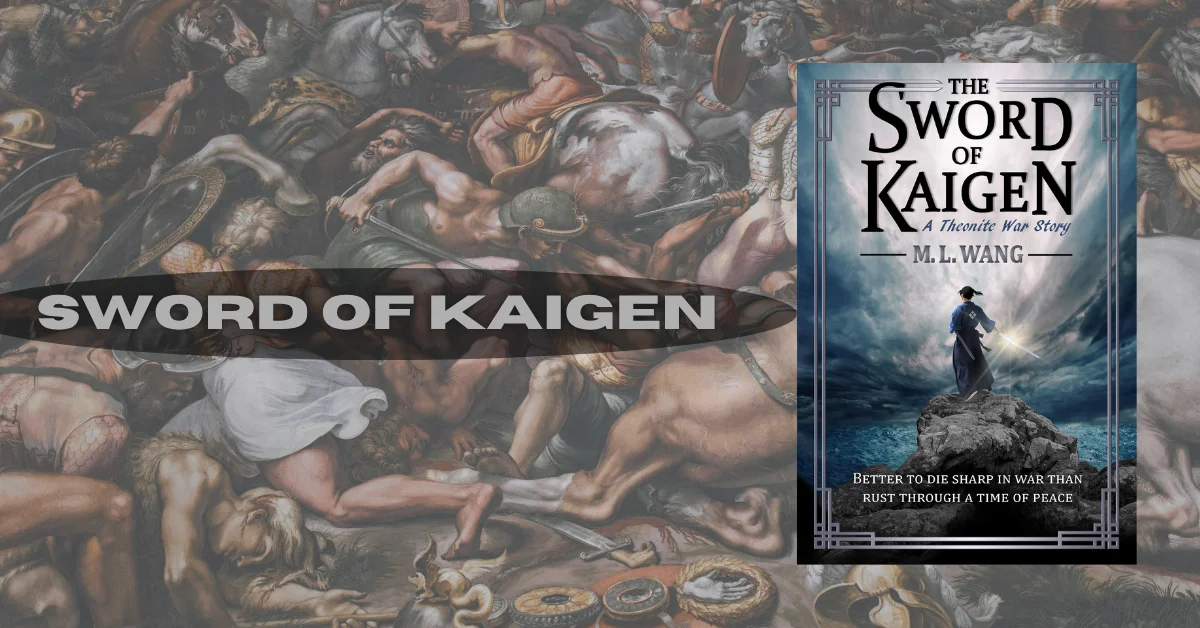🔍 Introduction
If there’s one book that’s both emotionally wrecked and completely enchanted readers in the grimdark fantasy space, it’s The Sword of Kaigen by M.L. Wang. This standalone novel isn’t just another magic-laced war tale—it’s an introspective, gut-punching journey through grief, resilience, and legacy.
So, what makes this self-published gem stand out in a sea of fantasy epics? Let’s dive deep into its frosted blades and fierce emotions.
👤 Author Spotlight
Who is M.L. Wang?
M.L. Wang may not be a household name like Brandon Sanderson or Robin Hobb, but within indie fantasy circles, she’s a legend. Her understanding of character-driven narratives and cultural layering is unmatched. Born and raised in the U.S. with Chinese heritage, Wang masterfully draws on both Eastern and Western storytelling traditions.
The Birth of Kaigen
The Sword of Kaigen wasn’t her first foray into the Thirteen Realms universe, but it’s the one that caught fire. Drawing inspiration from Japanese culture, samurai epics, and Avatar-esque elemental combat, Wang wanted to tell a story not about war—but about the people crushed under its weight.
🌏 Setting the Stage
The Kaigenese Empire
Imagine a mountainous, snow-drenched peninsula where tradition runs deep, and military pride is everything. That’s Kaigen. It’s both breathtaking and brutal—a place where children are trained for war and honor is carved deeper than the ice.
Where East Meets Magic
The fusion of traditional East Asian aesthetics with high fantasy makes Kaigen feel ancient yet electric. From spirit lore to ice-sword duels, every detail enriches the world-building.
📚 Plot Overview
Spoiler-Free Summary
At its core, The Sword of Kaigen follows Misaki, a mother who gave up her fighting past for domestic life, and Mamoru, her son trained to become a warrior. As threats mount and truths unravel, both are forced to face who they really are and what they must protect—even when it means sacrificing everything.
Family Over Everything
This isn’t a story about kings or rebels. It’s about a mother and son. About what happens when war reaches your doorstep, and you must pick between the nation you serve and the family you love.
🧍♀️ Characters That Cut Deep
Misaki: A Mother Like No Other
Forget tired “warrior mom” tropes. Misaki is layered, broken, and brilliantly written. She’s torn between her violent past and the roles she’s been forced to adopt. Watching her reclaim her power is both painful and inspiring.
Mamoru: Strength Through Clarity
Mamoru isn’t your usual coming-of-age hero. He learns through loss, failure, and brutal truth. His evolution is heart-wrenching but real.
Supporting Cast
From Takeru to the villagers, every side character has purpose and weight. No cardboard cutouts here—just humans navigating impossible choices.
❄️ The Magic System
Ice-Crafting and Beyond
The Takashi bloodline controls water and ice, forging swords mid-battle. It’s dazzling and deadly. Yet it never overshadows the emotional storytelling—it enhances it.
Comparisons
Think Avatar: The Last Airbender, but colder, sadder, and steeped in militarism. The elemental magic is more than flair—it’s legacy and identity.
🎭 Themes and Symbolism
The Toll of War
Wang doesn’t glorify war—she guts it. The novel explores PTSD, indoctrination, and the silent suffering of civilians. The battlefield may be snowy, but the pain burns hot.
Silent Strength of Women
Misaki’s story confronts cultural expectations of women—especially mothers. Her quiet rage and inner strength steal the show.
Generational Conflict
The novel is a dialogue between the old world and the new. Between silence and truth. Between what we inherit and what we change.
✍️ Writing Style
Language That Cuts
M.L. Wang’s prose is tight, poetic, and raw. It flows like a sword strike—precise and impactful. No bloated fantasy fluff—just emotion-packed storytelling.
Grimdark but Hopeful
It’s bleak. But never hopeless. Think The Poppy War with more heart. A Game of Thrones with more soul.
🏆 Reception and Recognition
A Darling of Indie Fantasy
The Sword of Kaigen won the 2019 SPFBO (Self-Published Fantasy Blog-Off) and has over 30,000 glowing reviews across platforms. Critics adore it. Fans re-read it. And it’s constantly recommended in fantasy circles.
Why It Resonates
Because it feels real. You don’t walk away remembering the magic—you remember the people, the losses, the choices.
📉 Breaking the Mold
No Chosen Ones Here
There’s no grand prophecy. No world-saving mission. Just a deeply personal battle set against the backdrop of a larger war.
Tropes Turned on Their Head
From motherhood to martial arts, nothing plays out how you expect. Wang subverts the genre beautifully.
💔 Emotional Weight
Get the Tissues
There are scenes that will emotionally wreck you. This book doesn’t pull punches. And that’s why it sticks with you.
Because It’s Too Real
The grief. The regret. The helplessness. It’s all written with terrifying authenticity.
📚 Compared to Other Works
Like These? You’ll Love Kaigen
- The Poppy War – For political and personal warfare
- A Song of Ice and Fire – For moral grayness
- Fullmetal Alchemist – For family-driven trauma
⚠️ Reader Warnings
Triggers to Know
This book contains graphic violence, war trauma, and themes of abuse and oppression. It’s not for the faint of heart—but it’s worth the emotional toll.
Who Should Read It?
Fans of emotionally intense, character-driven grimdark fantasy who want more than just swords and spells.
🧠 Fan Theories and Hidden Depths
The Sword as a Symbol
It’s not just a weapon—it’s tradition, suppression, identity. What you choose to wield, and what you choose to lay down, defines you.
Every Line Means Something
Pay attention to every scene. Wang laces her story with subtext and symbolism you’ll only catch on a second read.
🧾 Conclusion
The Sword of Kaigen is not just a fantasy novel. It’s an emotional odyssey—brutal, beautiful, and unforgettable. M.L. Wang delivers a story that haunts, heals, and ultimately transforms the way you see heroism, family, and sacrifice. It’s the kind of book that lingers long after you turn the final page.

